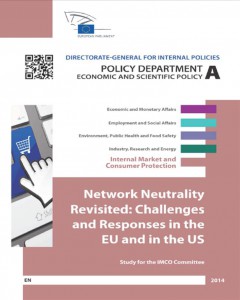 Christoph Steck /@christophsteck
Christoph Steck /@christophsteck
Director of Public Policy and Internet at Telefónica
 Before Christmas the European Parliament’s Committee on the Internal Market and Consumer Protection –the IMCO Committee– presented a little surprise: a new study it had commissioned (“Network Neutrality Revisited: Challenges and Responses in the EU and in the US”) which comes to the result that most fears about Net Neutrality violations in Europe are “speculative and overblown”. Moreover, as it lays out, this is also the view of the responsible Regulators in Europe, which believe that “problems are relatively rare” and can be managed with existing legal instruments. This detailed report should become a must-read for anyone interested in this complex issue, which too often is limited to shallow headlines and black-and-white views.
Before Christmas the European Parliament’s Committee on the Internal Market and Consumer Protection –the IMCO Committee– presented a little surprise: a new study it had commissioned (“Network Neutrality Revisited: Challenges and Responses in the EU and in the US”) which comes to the result that most fears about Net Neutrality violations in Europe are “speculative and overblown”. Moreover, as it lays out, this is also the view of the responsible Regulators in Europe, which believe that “problems are relatively rare” and can be managed with existing legal instruments. This detailed report should become a must-read for anyone interested in this complex issue, which too often is limited to shallow headlines and black-and-white views.
The technical part of the report reaffirms a longstanding position by broadband providers and ISPs: There are sound reasons for prioritizing traffic for delay sensitive uses. It also recalls that Quality-of-service was since its beginnings an important design consideration for the Internet.
The economic part stresses how in competitive markets quality and price differentiation are in practice often benefiting both producers and consumers, and that market based solutions are likely to be superior to regulatory ones; this points to Net Neutrality being in its core an issue of competition in the Internet access market which would benefit as such from a competition-law approach and not a ex-ante regulation and law.
Interestingly J. Scott Marcus, the rapporteur, highlights an often ignored fact: the responsible Telecommunication Regulators, the Body of European Regulators for Electronic Communications (BEREC) and the Member State National Regulatory Authorities (NRAs), do not view network neutrality as an unmanageable challenge that needs new laws: ‘For the time being, the situation appears to be mostly satisfactory and problems are relatively rare’. Concerns that network operators might favor prioritized and/or specialized services and try to make non-prioritized services unattractive or unusable, are said to be speculative, and though threats to freedom of expression are a serious concern worldwide, they would not require specific additional laws in Europe.
Finally, a few recommendations on Network Neutrality are provided for the European Parliament and also for national Member State authorities: It is important to avoid inappropriate, disproportionate, or premature action; preventative measures for threats that may or may not appear, risk doing more harm than good. And it is important to ensure that any approach that is taken is future-proof.
The implications of the key findings of the report should not to be neglected: lawmakers run the risk of prematurely regulating a thriving and dynamic market by imposing overly rigid Net Neutrality provisions. Market forces for the time being have worked well in avoiding any persistent blocking of Internet services or other uncompetitive behavior for Internet access. Additionally, Regulatory and Competition Authorities are constantly monitoring markets and can step in if necessary.
So, a good and detailed report that speaks out many truths which are sometimes lost in the heated and politicalized debate about Net Neutrality. I hope that the European Parliament will take due notice, and reconsider its decision from last April, which is not aligned with the conclusions of this report. Otherwise, Europe risks to take an overly interventionist approach which is going to give another blow to broadband infrastructure investments in Europe, endangering the prosperity and productivity of our societies and economies.








